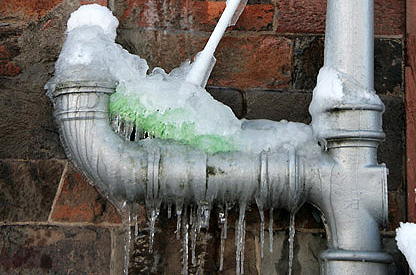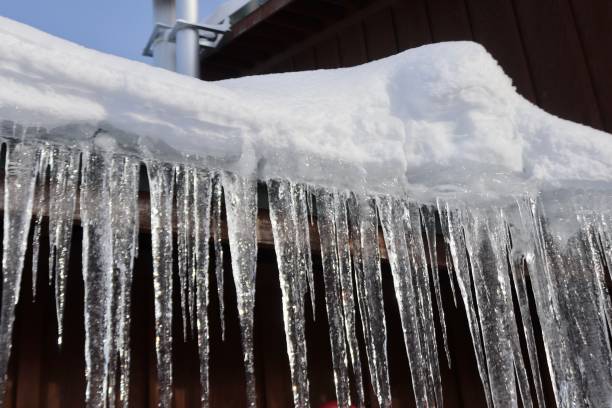Tips for Preventing Frozen Pipes in Winter: Expert Tips
Tips for Preventing Frozen Pipes in Winter: Expert Tips
Blog Article
The article underneath pertaining to Winter Plumbing Precautions: Preventing Frozen Pipes is rather attention-grabbing. Read it for yourself and figure out what you think of it.

Winter can wreak havoc on your plumbing, especially by freezing pipelines. Below's how to prevent it from occurring and what to do if it does.
Intro
As temperature levels decline, the threat of icy pipelines rises, possibly leading to costly repairs and water damages. Recognizing just how to stop icy pipelines is vital for house owners in chilly climates.
Avoidance Tips
Shielding susceptible pipes
Cover pipes in insulation sleeves or use warmth tape to safeguard them from freezing temperatures. Concentrate on pipelines in unheated or external locations of the home.
Heating methods
Keep indoor rooms effectively heated, especially locations with plumbing. Open cabinet doors to enable warm air to flow around pipes under sinks.
Exactly how to determine icy pipes
Look for lowered water circulation from taps, uncommon odors or noises from pipelines, and visible frost on subjected pipelines.
Long-Term Solutions
Architectural adjustments
Think about rerouting pipelines far from outside wall surfaces or unheated areas. Include extra insulation to attic rooms, cellars, and crawl spaces.
Updating insulation
Invest in top notch insulation for pipelines, attic rooms, and wall surfaces. Proper insulation helps maintain constant temperature levels and reduces the danger of frozen pipelines.
Protecting Outside Pipes
Yard tubes and outdoor faucets
Detach and drain pipes garden hoses prior to winter season. Mount frost-proof faucets or cover outdoor taps with shielded caps.
Understanding Frozen Pipes
What triggers pipelines to freeze?
Pipelines freeze when exposed to temperature levels below 32 ° F (0 ° C) for prolonged periods. As water inside the pipelines freezes, it increases, taxing the pipeline walls and potentially causing them to burst.
Threats and problems
Frozen pipelines can bring about water interruptions, property damages, and expensive repair services. Ruptured pipelines can flood homes and trigger extensive structural damage.
Signs of Frozen Pipeline
Determining frozen pipes early can stop them from breaking.
What to Do If Your Pipelines Freeze
Immediate actions to take
If you think frozen pipelines, keep taps open up to relieve pressure as the ice thaws. Make use of a hairdryer or towels taken in warm water to thaw pipelines slowly.
Final thought
Stopping frozen pipelines needs positive measures and fast reactions. By understanding the reasons, indicators, and preventive measures, house owners can shield their plumbing throughout winter.
Helpful Tips to Prevent Frozen Pipes this Winter
UNDERSTANDING THE BASICS: WHY PIPES FREEZE AND WHY IT’S A PROBLEM
Water freezing inside pipes is common during the winter months, but understanding why pipes freeze, and the potential problems it can cause is crucial in preventing such incidents. This section will delve into the basics of why pipes freeze and the associated problems that may arise.
THE SCIENCE BEHIND FROZEN PIPES
When water reaches freezing temperatures, it undergoes a physical transformation and solidifies into ice. This expansion of water as it freezes is the primary reason pipes can burst. As the water inside the pipe freezes, it expands, creating immense pressure on the walls. If the pressure becomes too great, the pipe can crack or rupture, leading to leaks and water damage.
FACTORS THAT CONTRIBUTE TO PIPE FREEZING
Low Temperatures: Extremely cold weather, especially below freezing, increases the risk of pipes freezing. Uninsulated or Poorly Insulated Pipes: Pipes located in unheated areas, such as basements, crawl spaces, or attics, are more prone to freezing. Insufficient insulation or lack of insulation altogether exacerbates the problem. Exterior Wall Exposure: Pipes running along exterior walls are susceptible to freezing as they encounter colder temperatures outside. Lack of Heating or Temperature Regulation: Inadequate heating or inconsistent temperature control in your home can contribute to frozen pipes. PROBLEMS CAUSED BY FROZEN PIPES
- Pipe Bursting: As mentioned earlier, the expansion of water as it freezes can cause pipes to burst, resulting in significant water damage.
- Water Damage: When pipes burst, it can lead to flooding and water damage to your property, including walls, ceilings, flooring, and personal belongings.
- Structural Damage: Prolonged exposure to water from burst pipes can compromise the structural integrity of your home, leading to costly repairs.
- Mold and Mildew Growth: Excess moisture from water damage can create a favorable environment for mold and mildew growth, posing health risks to occupants.
- Disrupted Water Supply: Frozen pipes can also result in a complete or partial loss of water supply until the issue is resolved.
WHY CERTAIN PIPES ARE MORE PRONE TO FREEZING
- Location: Pipes located in unheated or poorly insulated areas, such as basements, crawl spaces, attics, or exterior walls, are at higher risk of freezing.
- Exterior Pipes: Outdoor pipes, such as those used for irrigation or exposed plumbing, are particularly vulnerable to freezing as they are directly exposed to the elements.
- Supply Lines: Pipes that carry water from the main water supply into your home, including the main water line, are critical to protect as freezing in these lines can affect your entire plumbing system.
- Underground Pipes: Pipes buried underground, such as those connected to sprinkler systems or outdoor faucets, can be susceptible to freezing if not properly insulated.
https://busybusy.com/blog/helpful-tips-to-prevent-frozen-pipes-this-winter/

Hopefully you enjoyed our section on Prevent Frozen Pipes . Thanks a lot for taking the time to read our blog. Are you aware of somebody else who is enthusiastic about Winter Plumbing Precautions: Preventing Frozen Pipes? Take a moment to share it. We enjoy your readership.
Call Today Report this page